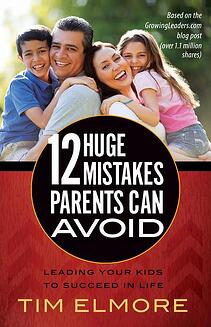 Parenting is both an art and a science. Few of us received any training for it. Americans average 12 to 14 years of school before they enter their careers. We go through classes, study, and take a test to get a license to drive a car. Yet we are thrust into the parenting journey with no such preparation. Most of us begin molding the life of an emerging adult without ever reading a book on the subject. One of the most common mistakes we make (for lack of training) is removing consequences for kids. We want our kids to be happy, content, and well-adjusted. When conflict arises, our first inclination is to solve the problem for them. After all, we are their leaders.
Parenting is both an art and a science. Few of us received any training for it. Americans average 12 to 14 years of school before they enter their careers. We go through classes, study, and take a test to get a license to drive a car. Yet we are thrust into the parenting journey with no such preparation. Most of us begin molding the life of an emerging adult without ever reading a book on the subject. One of the most common mistakes we make (for lack of training) is removing consequences for kids. We want our kids to be happy, content, and well-adjusted. When conflict arises, our first inclination is to solve the problem for them. After all, we are their leaders.
Is This About Now or Later?
The fact is, we often live, lead, and parent only for today. We just want peace right now, and we forget the long-term impact on our kids. My mother and father modeled long-term parenting all through my growing-up years. When I stole something as a young kid, I had to march down to the store and give it back with an apology. If I lied or cheated, it was the same thing. Consequences came even if it was a little white lie or cheating on a very small problem. Why? It was the principle of the thing. My parents knew I was forming long-term patterns in my life every day.
According to one US poll, the majority of parents admit their kids have too little responsibility. Compared to their parents’ generation or grandparents’ generation, we’ve busied our children with soccer games and piano recitals but not with real responsibility such as work, service, or even chores around the house. A kid can learn some disciplines from games or recitals, but authentic responsibility comes from the real world, where we serve others who cannot help themselves or in exchange for a paycheck. The exchange has an internal effect on us, even as kids. Why? Because the consequences are real. Losing isn’t simply about a soccer scoreboard or messing up on a song in a recital, but about affecting real people. As our kids grow older, the benefits and the consequences must become real.
So What Can We Do?
Here are some tips for teaching kids responsibility:
- Let them struggle, and if they fail, interpret the experience with them.
Don’t rescue them, but if they fall or fail, talk it over. Show them it’s not the end of the world or a reflection on their identity. It’s a chance to try again.
- Tell them stories about your own struggles and failures.
My kids love to hear me talk about my past flops, failures, and fumbles. As we laugh together, they think, “Wow, if you did that and still made it, maybe there’s hope for me.”
- Don’t expect teachers to be nannies to your child.
As you interact with your child’s teachers, don’t ask them to give special favors or to be a second mom or dad. They are a good precursor to a boss at work.
- Stop making excuses.
When your children make a mistake, help them to own it. Don’t teach them to blame others or make excuses. They must eventually learn that life isn’t fair.
Remember:
When we insulate kids and remove consequences from actions, we fail to prepare them for the future that awaits them.
Excerpted from 12 Huge Mistakes Parents Can Avoid by Tim Elmore
 Dr. Tim Elmore is the president of Growing Leaders, a nonprofit that provides 6000 public schools, universities, civic organizations, and corporations with resources that foster the growth of young leaders. He is the author of more than 25 books and speaks at more than 100 events annually.
Dr. Tim Elmore is the president of Growing Leaders, a nonprofit that provides 6000 public schools, universities, civic organizations, and corporations with resources that foster the growth of young leaders. He is the author of more than 25 books and speaks at more than 100 events annually.
Before you can teach your children, you have to be able to communicate with them. Are you and your kids communicating? Take Jay Payleitner's quiz and learn more!


